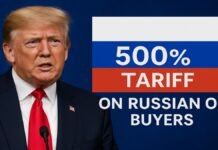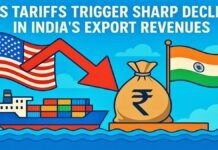
Key Points
- US President Donald Trump gives Russia a 50-day ultimatum to end Ukraine war threatens 100% tariffs on nations trading with Russia
- India, sourcing 35-40% of crude oil from Russia, faces major economic risk if forced to shift suppliers
- Potential petrol and diesel price hike of ₹8–12/liter if crude rises to $140/barrel
- EU targets India’s Nayara refinery in latest sanctions on Russia
- Russia shows little concern over new US threats, but global oil dynamics hang in balance
New Delhi: In a major escalation of economic pressure, US President Donald Trump has announced that the US will impose 100% “secondary tariffs” on countries continuing trade with Russia if Moscow does not agree to end hostilities in Ukraine within 50 days. The new US policy aims to cripple Russia’s economy and force a rapid conclusion to the conflict.
These sweeping tariffs target any nation like India or China that maintains trade ties with Russia. Imports from these countries into the US would become dramatically more expensive, likely triggering a global realignment of trade patterns and diplomatic tensions.
Impact Deadline: September 2, 2025
- The 50-day deadline runs out on September 2.
- So far, Russia’s official response has been dismissive, continuing to ramp up trade with Asian partners, especially India.
India’s Energy Security at Stake
India’s Heavy Reliance on Russian Crude
- India currently imports 35–40% of its crude oil from Russia, a massive increase from just 2% before 2022.
- The surge in Russian imports has been a cornerstone in India’s efforts to maintain affordable energy prices and control inflation amid global volatility.
What Happens if Trump’s Tariffs Hit?
- India faces an immediate dilemma: risk steep trade penalties from the US, or scramble to replace Russian oil with costlier supplies.
- The discount on Russian oil once $10–12/barrel cheaper is narrowing, but India still saves billions by importing from Russia.
- Experts warn that if India halts Russian imports and global crude spikes to $140/barrel, petrol and diesel prices could jump ₹8–12/liter, stoking inflation and increasing the nation’s current account deficit.
- Petroleum Minister Hardeep Singh Puri confirmed that a US crackdown could force India to seek expensive alternatives, with significant impact on household and industrial energy costs.
EU’s Most Stringent Sanctions Yet: India’s Nayara Refinery Targeted
- The European Union’s 18th round of sanctions directly targets India’s Vadinar refinery, operated by Nayara Energy (49.13% owned by Russia’s state oil giant Rosneft).
- The move marks the first time an Indian facility has faced such measures, escalating risks for India’s energy sector and drawing harsh criticism from Moscow.
- Rosneft labeled the sanctions “unjustified and illegal,” arguing they undermine India’s energy security. So far, India rejects “unilateral sanction measures” and vows to protect its energy interests.
Global Oil Markets: Risks of a Supply Shock
- Russia produces about 10% of global crude oil supply.
- Any disruption in Russian exports could fuel a worldwide surge in oil prices, cascading into higher inflation and economic instability especially for major importers like India.
- Indian officials and refinery executives believe that while the supply itself may remain unbroken, the loss of discounts on Russian oil would be immediate, narrowing profit margins and harming consumers.
The Road Ahead
- As the September 2 deadline approaches, markets and policymakers worldwide are bracing for potential economic shockwaves.
- The situation may force India into tough choices between preserving its energy security, shielding its economy from inflation, and managing strategic relations with both Washington and Moscow.
India, already in delicate trade negotiations with the US, now faces an unprecedented “headache” that could disrupt both its budget and its growth priorities in the months ahead.





















































